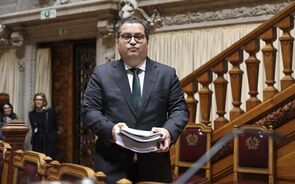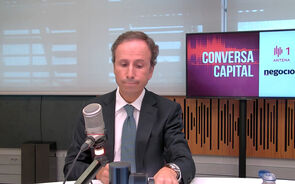Task-"Whispers Grow Louder of a Possible Fed Ease"
2 mensagens
|Página 1 de 1
Excelente artigo!
Sem duvida um bom artigo para ler e ponderar!
Obrigado Ulisses!
Surfer
Obrigado Ulisses!
Surfer
Task-"Whispers Grow Louder of a Possible Fed Ease"
Aqui fica um artigo do nosso já conhecido Aaron Task sobre a decisão da FED quanto às taxas.
"Whispers Grow Louder of a Possible Fed Ease"
By Aaron L. Task
Senior Writer
01/28/2003 07:13 AM EST
"Major stock proxies are at their lowest levels since October, recent economic data have been lackluster, and consumer confidence is waning amid rising unemployment and increased prospects for war with Iraq. Given that backdrop, it's time to contemplate something nearly unthinkable just a few months ago: Might the Federal Reserve's next move be yet another easing?
The odds are under 10%, according to fed fund futures, that the Federal Open Market Committee will lower rates at its policy meeting on Wednesday. Financial market participants are mainly focused on whether the FOMC will change its so-called risk-assessment statement to one weighted toward economic weakness.
Still, the Fed does have room to lower rates further, specifically 125 basis points. Fed officials spent much of late 2002 talking about their options to combat deflation even if the fed funds target were to fall to zero. Most notable among them was a November speech by Fed Governor Ben S. Bernanke who expressed confidence the Fed "would take whatever means necessary to prevent significant deflation in the U.S."
Bernanke's use of Malcolm X's famous phrase (intentional or not) indicates that future Fed easing isn't an outrageous proposition. Certainly some respected economists are taking it seriously.
"There is a meaningful risk of another rate cut at the March 18 meeting," William Dudley, director of U.S. economic research at Goldman Sachs, wrote in a report released Monday evening.
Before Dudley's comments, the potential for another ease had mainly been a "whispers in the wind"-type discussion, and one largely being conducted by hard-core bears. But Dudley's forecast makes this a more mainstream concern and he too is concerned about whether additional easing will have the intended effect of boosting economic activity. "Monetary policy is likely to prove much less stimulative in 2003 than in 2002," he commented last week.
Monetary policy stimulates the economy through "three channels," Dudley observed, namely interest rates, wealth creation, and the dollar and trade. Of these, only the interest rate channel has been working properly, he argued, but robust consumer borrowing for purchases of homes and autos in 2001 and 2002 was often borrowed from the future. "Put simply, the impact via the interest channel has already been largely felt," he wrote.
As for the other two channels, the dollar has weakened, most notably vs. the euro, but its decline is "trivial" in terms of spurring trade, the economist suggested, when compared with its 35% appreciation from 1995 to 2002.
Looking ahead, Dudley called a depreciating dollar "the monetary gift that keeps on giving," meaning that dollar/trade channel should prove more stimulative this year. However, the interest rate channel generally turns negative in year three of an easing cycle, he noted, citing the Fed's own macroeconomic models.
The wealth channel has been "working in the wrong direction," Dudley said, as evinced by the ongoing weakness in equity prices. The wealth channel has been "working in the wrong direction," Dudley said, as evinced by the ongoing weakness in equity prices. Monetary policy works with a lag, which differs among the three channels, but myriad bullish forecasts proved woefully inaccurate this cycle about how well stocks do after the first, second, third, etc. easing.
Law of Unintended Consequence
Jim Bianco, president of Bianco Research in Chicago, offered another twist on the debate and argued: "Should [the Fed] move, it would be a tremendous mistake."
As reported previously, Bianco believes the Fed has overstated the potential of deflation and risks triggering an upturn of inflationary pressures, with its aggressive policy stance. (Indeed, that may be the Fed's intent, as Alan Greenspan & Co. figure it's easier to deal with inflation than deflation.)
Additionally, he suggested that "the single biggest impediment to the financial markets getting better is lower rates," and another ease only will exacerbate such stresses. "If [the] Fed actually wanted to help the stock market, they'd raise rates to alleviate stress on the derivatives market." (How's that for contrarian thinking?)
Specifically, Bianco cited the problem of ever-lower rates causing prepayments of callable issues -- most notably mortgage-backed securities, or MBS -- leaving holders of such securities faced with the prospect of reinvesting in a lower-rate environment. In addition to being forced to reinvest assets in a lower-return environment, many firms may find themselves with a mismatch of assets vs. liabilities.
It's no coincidence that concerns about Fannie Mae's duration gap diminished considerably as the yield on the benchmark 10-year note rose from 3.57% on Oct. 9 to a range of about 10 basis points either side of 4% in the nearly four months since. (The 10-year note is most closely correlated to mortgage rates, which, when refinanced, trigger prepayments of MBS.)
"Fannie Mae is basically the leading edge of this but it's by no means alone," Bianco said, suggesting the unintended consequence of lower rates "affects everybody" in the financial realm.
Many banks and hedge funds that find themselves in a similar predicament may engage in swaps contracts to try to realign their assets and liabilities, he said. "The problem is the weak assumption we are forever going to have an infinitely liquid derivatives market. If the Fed cuts rates, it puts more pressure on the derivatives market."
I ran all this by the head derivatives trader at a New York-based bank, who spoke on the condition of anonymity. He agreed that "someone like Fannie Mae or Freddie Mac could temporarily overwhelm the [swaps] market with their needs" at a time of heavy prepayment activity, suggesting such a development occurred in November 2001 and again last fall.
However, Fannie and Freddie also bundle mortgages and sell them to other MBS investors, which can make up for cash flow lost when their own mortgage-backed investments are called, he noted. Similarly, banks such as Wells Fargo also act as both holders and originators of MBS.
Finally, "we don't see signs of stress in the options market or eurodollar market," the trader said, suggesting there's currently little concern about such dislocations.
Then again, few market players are presently focused on the potential for another ease and the Fed hasn't moved, yet. "
(in www.realmoney.com)
"Whispers Grow Louder of a Possible Fed Ease"
By Aaron L. Task
Senior Writer
01/28/2003 07:13 AM EST
"Major stock proxies are at their lowest levels since October, recent economic data have been lackluster, and consumer confidence is waning amid rising unemployment and increased prospects for war with Iraq. Given that backdrop, it's time to contemplate something nearly unthinkable just a few months ago: Might the Federal Reserve's next move be yet another easing?
The odds are under 10%, according to fed fund futures, that the Federal Open Market Committee will lower rates at its policy meeting on Wednesday. Financial market participants are mainly focused on whether the FOMC will change its so-called risk-assessment statement to one weighted toward economic weakness.
Still, the Fed does have room to lower rates further, specifically 125 basis points. Fed officials spent much of late 2002 talking about their options to combat deflation even if the fed funds target were to fall to zero. Most notable among them was a November speech by Fed Governor Ben S. Bernanke who expressed confidence the Fed "would take whatever means necessary to prevent significant deflation in the U.S."
Bernanke's use of Malcolm X's famous phrase (intentional or not) indicates that future Fed easing isn't an outrageous proposition. Certainly some respected economists are taking it seriously.
"There is a meaningful risk of another rate cut at the March 18 meeting," William Dudley, director of U.S. economic research at Goldman Sachs, wrote in a report released Monday evening.
Before Dudley's comments, the potential for another ease had mainly been a "whispers in the wind"-type discussion, and one largely being conducted by hard-core bears. But Dudley's forecast makes this a more mainstream concern and he too is concerned about whether additional easing will have the intended effect of boosting economic activity. "Monetary policy is likely to prove much less stimulative in 2003 than in 2002," he commented last week.
Monetary policy stimulates the economy through "three channels," Dudley observed, namely interest rates, wealth creation, and the dollar and trade. Of these, only the interest rate channel has been working properly, he argued, but robust consumer borrowing for purchases of homes and autos in 2001 and 2002 was often borrowed from the future. "Put simply, the impact via the interest channel has already been largely felt," he wrote.
As for the other two channels, the dollar has weakened, most notably vs. the euro, but its decline is "trivial" in terms of spurring trade, the economist suggested, when compared with its 35% appreciation from 1995 to 2002.
Looking ahead, Dudley called a depreciating dollar "the monetary gift that keeps on giving," meaning that dollar/trade channel should prove more stimulative this year. However, the interest rate channel generally turns negative in year three of an easing cycle, he noted, citing the Fed's own macroeconomic models.
The wealth channel has been "working in the wrong direction," Dudley said, as evinced by the ongoing weakness in equity prices. The wealth channel has been "working in the wrong direction," Dudley said, as evinced by the ongoing weakness in equity prices. Monetary policy works with a lag, which differs among the three channels, but myriad bullish forecasts proved woefully inaccurate this cycle about how well stocks do after the first, second, third, etc. easing.
Law of Unintended Consequence
Jim Bianco, president of Bianco Research in Chicago, offered another twist on the debate and argued: "Should [the Fed] move, it would be a tremendous mistake."
As reported previously, Bianco believes the Fed has overstated the potential of deflation and risks triggering an upturn of inflationary pressures, with its aggressive policy stance. (Indeed, that may be the Fed's intent, as Alan Greenspan & Co. figure it's easier to deal with inflation than deflation.)
Additionally, he suggested that "the single biggest impediment to the financial markets getting better is lower rates," and another ease only will exacerbate such stresses. "If [the] Fed actually wanted to help the stock market, they'd raise rates to alleviate stress on the derivatives market." (How's that for contrarian thinking?)
Specifically, Bianco cited the problem of ever-lower rates causing prepayments of callable issues -- most notably mortgage-backed securities, or MBS -- leaving holders of such securities faced with the prospect of reinvesting in a lower-rate environment. In addition to being forced to reinvest assets in a lower-return environment, many firms may find themselves with a mismatch of assets vs. liabilities.
It's no coincidence that concerns about Fannie Mae's duration gap diminished considerably as the yield on the benchmark 10-year note rose from 3.57% on Oct. 9 to a range of about 10 basis points either side of 4% in the nearly four months since. (The 10-year note is most closely correlated to mortgage rates, which, when refinanced, trigger prepayments of MBS.)
"Fannie Mae is basically the leading edge of this but it's by no means alone," Bianco said, suggesting the unintended consequence of lower rates "affects everybody" in the financial realm.
Many banks and hedge funds that find themselves in a similar predicament may engage in swaps contracts to try to realign their assets and liabilities, he said. "The problem is the weak assumption we are forever going to have an infinitely liquid derivatives market. If the Fed cuts rates, it puts more pressure on the derivatives market."
I ran all this by the head derivatives trader at a New York-based bank, who spoke on the condition of anonymity. He agreed that "someone like Fannie Mae or Freddie Mac could temporarily overwhelm the [swaps] market with their needs" at a time of heavy prepayment activity, suggesting such a development occurred in November 2001 and again last fall.
However, Fannie and Freddie also bundle mortgages and sell them to other MBS investors, which can make up for cash flow lost when their own mortgage-backed investments are called, he noted. Similarly, banks such as Wells Fargo also act as both holders and originators of MBS.
Finally, "we don't see signs of stress in the options market or eurodollar market," the trader said, suggesting there's currently little concern about such dislocations.
Then again, few market players are presently focused on the potential for another ease and the Fed hasn't moved, yet. "
(in www.realmoney.com)
2 mensagens
|Página 1 de 1



